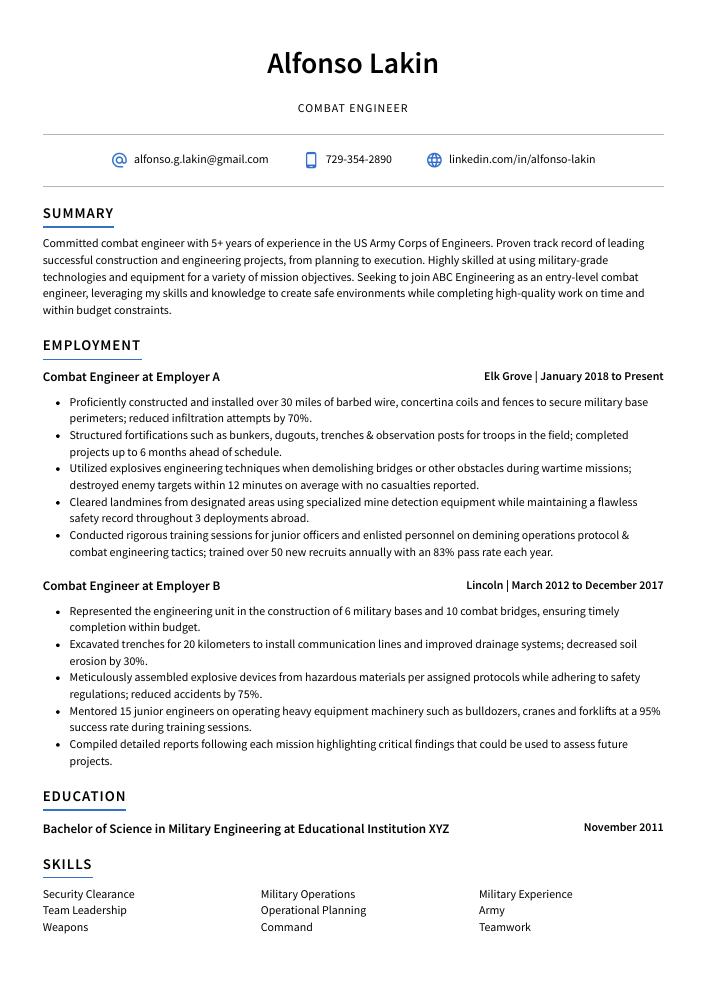
Combat engineers are responsible for a wide range of activities, from building and maintaining roads and bridges to constructing defensive positions. They use engineering principles to plan, design, construct, maintain or repair combat support systems such as fortifications and obstacles in order to ensure the success of military operations. In addition they provide technical advice on tactical movements during offensive or defensive operations.
You have the experience and training to be a successful combat engineer, but potential employers don’t know that. To help them understand your qualifications and make you stand out from other applicants, you must write an impressive resume.
This guide will walk you through the entire process of creating a top-notch resume. We first show you a complete example and then break down what each resume section should look like.

The guide is divided into sections for your convenience. You can read it from beginning to end or use the table of contents below to jump to a specific part.
Alfonso Lakin
Combat Engineer
Summary
Committed combat engineer with 5+ years of experience in the US Army Corps of Engineers. Proven track record of leading successful construction and engineering projects, from planning to execution. Highly skilled at using military-grade technologies and equipment for a variety of mission objectives. Seeking to join ABC Engineering as an entry-level combat engineer, leveraging my skills and knowledge to create safe environments while completing high-quality work on time and within budget constraints.
Experience
Combat Engineer, Employer A
Elk Grove, Jan 2018 – Present
Combat Engineer, Employer B
Lincoln, Mar 2012 – Dec 2017
Skills
Education
Bachelor of Science in Military Engineering
Educational Institution XYZ
Nov 2011
Certifications
Combat Engineer (12B)
United States Army
May 2017
The summary/objective at the top of your resume should be a brief but powerful statement that showcases why you are an ideal candidate for the combat engineer position. Here is where you can highlight your military experience, any certifications or training courses related to engineering and construction, as well as any special skills such as problem solving and communication. You could also mention how many years of experience in this field you have and what sets you apart from other candidates.
Below are some resume summary examples:
Hard-working, detail-oriented Combat Engineer with 5+ years of experience in the US Army. Seeking a position that will utilize my technical knowledge and problem-solving skills to make an impact on military operations. At XYZ, led successful missions involving demolition, construction/repair of fortifications and obstacles, reconnaissance support for combat units as well as landmine clearance operations. Received multiple medals for service excellence and dedication during active duty deployments.
Detail-oriented combat engineer with 6+ years of experience in the US Army. Experienced in operating and maintaining heavy equipment, managing personnel, coordinating engineering operations, and planning combat missions. Skilled at assessing terrain to develop effective defense strategies and ensure efficient use of resources during deployments. Recognized for my ability to build bridges quickly under extreme pressure while working with minimal civilian support or resources.
Professional combat engineer with 8+ years of experience in the military. Seeking to leverage expertise and skills in tactical operations, combat engineering tasks, mine warfare, and demolition for ABC Company. At XYZ Military Base, led a team of 12 personnel through an extensive landmine clearance project on schedule and under budget. Awarded the “Outstanding Achievement” medal for successful completion of mission objectives without any casualties or injuries.
Skilled combat engineer with extensive experience in infantry support, tactical operations, and combat construction. Proven ability to motivate a team of up to 50 personnel during intensive training exercises and deployment overseas. Recognized for working effectively under pressure while ensuring the safety of others as well as equipment and supplies. Looking to join ABC Corps where my expertise can be leveraged for successful deployments abroad.
Determined combat engineer with 4+ years of service in the US Marine Corps. Seeking to build upon existing experience and knowledge by providing engineering support for ABC. Proven record of successfully leading and managing combat missions involving reconnaissance, demolition, construction, and repair projects under extreme conditions. Received numerous awards such as Navy Achievement Medal for outstanding performance during deployments.
Accomplished combat engineer with 7+ years of experience in the military and 5+ years as a civilian contractor. Proven track record leading teams to complete complex construction projects, including bridges, roads, fortifications, and tactical installations. Eager to apply expertise at ABC Engineering Solutions where I can help build safe structures while meeting tight deadlines.
Energetic combat engineer with 8+ years of experience in the armed forces. Served as a team leader and supervisor during multiple deployments, overseeing daily operations; received commendations for exemplary service. Now looking to leverage organizational and technical skills at ABC Defense Corp., where I can use my knowledge and expertise to help build better defense systems.
Talented combat engineer with 4+ years of experience in tactical operations, construction engineering, and force protection. Seeking to leverage expertise in combat tactics and weapons systems to become the next Combat Engineer for ABC Company. At XYZ Infantry Unit, developed a comprehensive training program that improved accuracy by 44% among junior officers.
The employment (or experience) section is where you provide details on your past jobs. This should be written in reverse chronological order, meaning the most recent job is listed first.
When writing this section, stick to bullet points; doing so makes it easier for a reader to quickly take in what you have said. You want to think about the specific tasks and results of each role when crafting your bullets – try not to just list duties but also explain how they were accomplished or the outcomes achieved from them.
For example, instead of saying “Built defensive structures,” you could say, “Constructed fortified walls using sandbags and barbed wire that provided protection against enemy forces.”
To write effective bullet points, begin with a strong verb or adverb. Industry specific verbs to use are:
Other general verbs you can use are:
Below are some example bullet points:
Two organizations that have advertised for a position with the same title may be searching for individuals whose skills are quite different. For instance, one might be looking for someone who is knowledgeable in the use of explosives, while another may want a combat engineer with experience in construction and engineering.
Therefore, it is important to tailor your skills section according to each job you are applying for. This will ensure that applicant tracking systems can pick out the keywords they need to pass on your resume to human recruiters.
In addition, this section should not just list all of your relevant skills; instead, you should focus on those most pertinent to each position and elaborate further by discussing them in other sections such as the summary or work experience.
Below is a list of common skills & terms:
Adding an education section to your resume will depend on how far along you are in your career. If you just graduated and have no prior work experience, it is best to mention your education below the resume objective. However, if you have worked as a combat engineer for some time now and can showcase plenty of relevant skills and responsibilities, omitting an education section may be more beneficial.
If including an education section, try to list courses related to engineering or military science that could help demonstrate knowledge pertinent to the job role.
Bachelor of Science in Military Engineering
Educational Institution XYZ
Nov 2011
Certifications are a great way to demonstrate your knowledge and expertise in a certain field. They show that you have taken the time to learn about the subject matter, as well as prove that you are proficient in it.
Including certifications on your resume can be beneficial when applying for jobs, especially if they relate directly to the position or industry. It is important to make sure all of your certifications are up-to-date and relevant so employers know you’re serious about staying current with industry trends.
Combat Engineer (12B)
United States Army
May 2017
Your name should be the first thing a reader sees when viewing your resume, so ensure its positioning is prominent. Your phone number should be written in the most commonly used format in your country/city/state, and your email address should be professional.
You can also choose to include a link to your LinkedIn profile, personal website, or other online platforms relevant to your industry.
Finally, name your resume file appropriately to help hiring managers; for Alfonso Lakin, this would be Alfonso-Lakin-resume.pdf or Alfonso-Lakin-resume.docx.
Cover letters are an important part of the job application process. They are usually made up of 2 to 4 brief paragraphs and provide more detail than what is already mentioned in a resume. Cover letters allow applicants to demonstrate their suitability for a role, explain why they’re interested in it, and highlight any relevant qualifications or experience that would be beneficial for the position.
Whilst not all jobs require you to submit one, writing a cover letter can help your application stand out from others by displaying your personality as well as professional skillset. Therefore, submitting one with each job application could give you an edge over other candidates who don’t include them!
Below is an example cover letter:
I am writing to apply for the position of Combat Engineer with the United States Army. As a highly skilled and experienced engineer, I am confident I can be an asset to your organization.
My experience includes working as an engineer in both combat and non-combat situations. In my most recent role, I was responsible for leading a team of engineers in Iraq during Operation Iraqi Freedom. My duties included supervising the construction of roads, bridges, and other infrastructure projects while also providing support to troops in combat operations.
In addition to my engineering experience, I have also received training in demolition and explosives disposal. This training has come in handy on many occasions, including when I successfully disarmed an improvised explosive device (IED) that had been planted by insurgents near one of our construction sites.
I am confident that my skills and experience will enable me to make a positive contribution to your organization. I look forward to speaking with you about this opportunity soon.
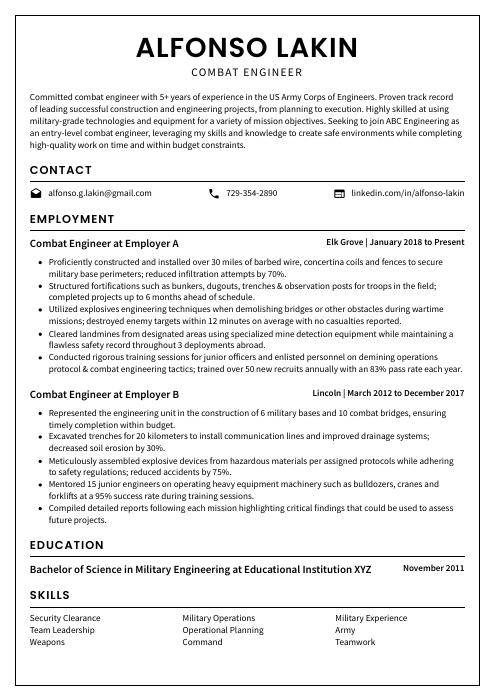
Cormorant
Use this template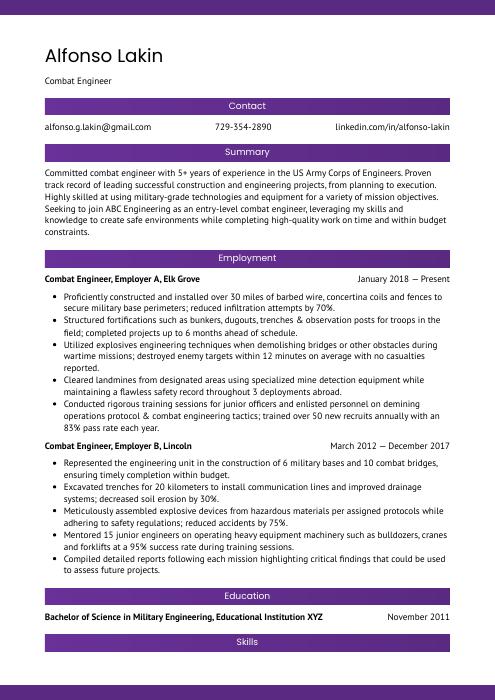
Jerboa
Use this template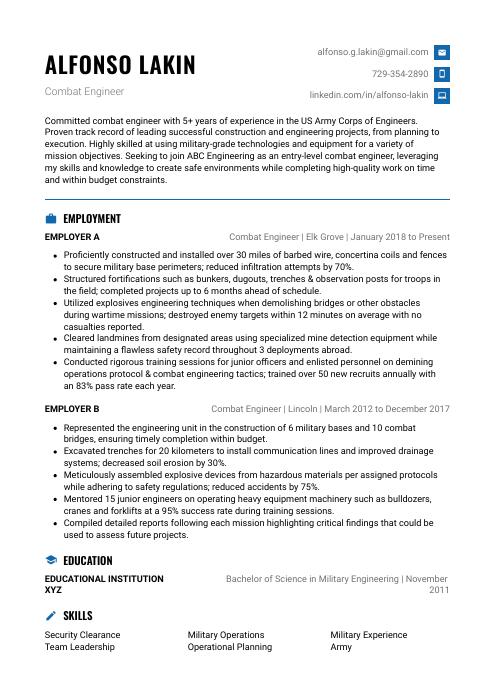
Echidna
Use this template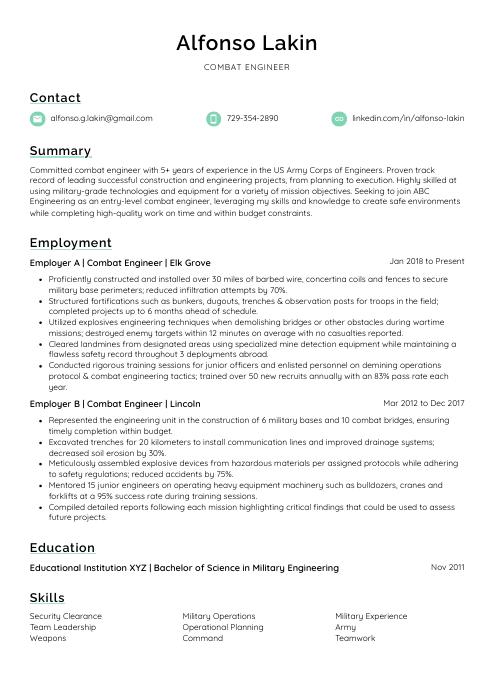
Lorikeet
Use this template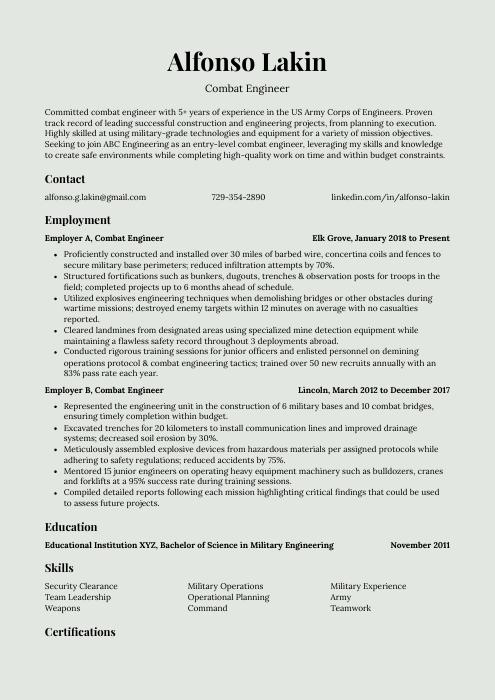
Saola
Use this template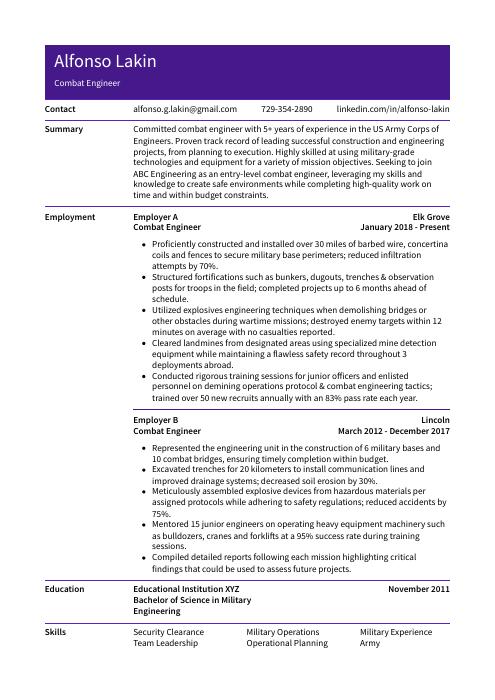
Pika
Use this template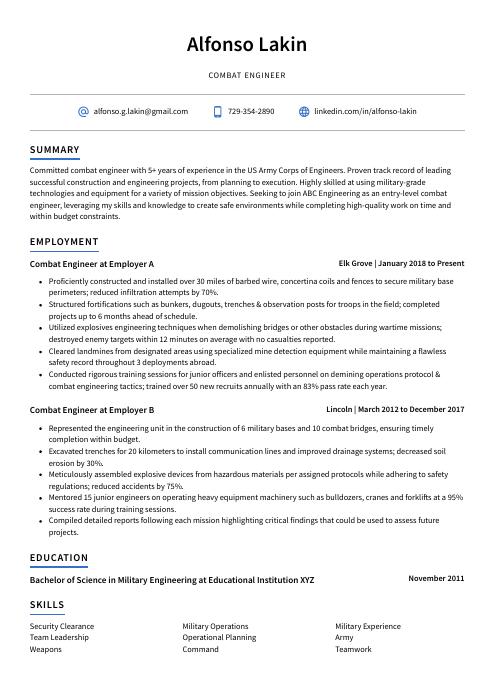
Axolotl
Use this template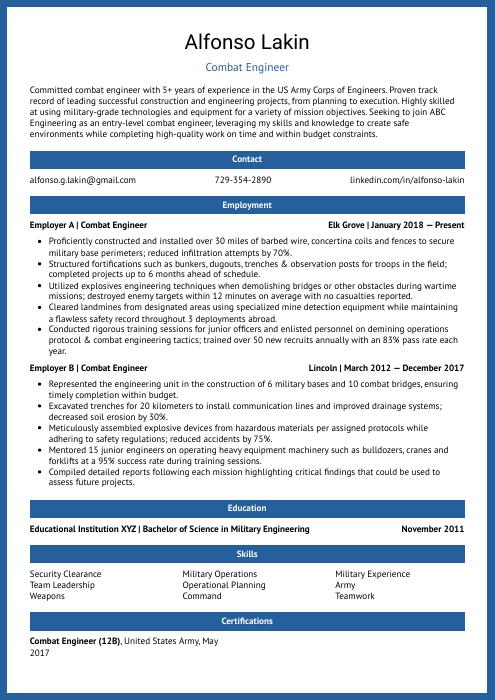
Ocelot
Use this template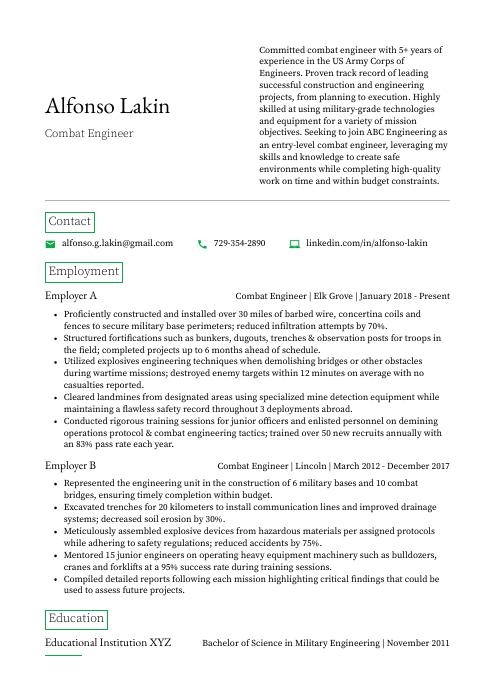
Quokka
Use this template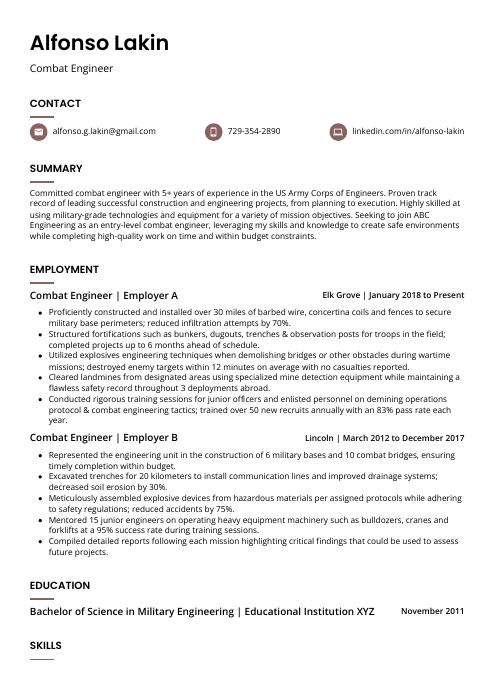
Fossa
Use this template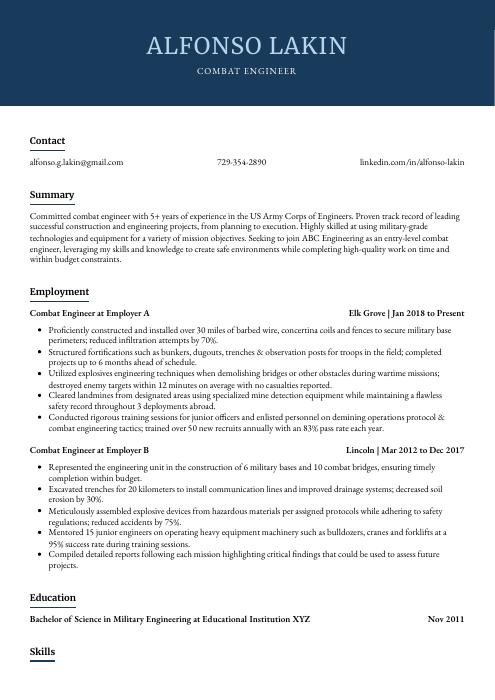
Bonobo
Use this template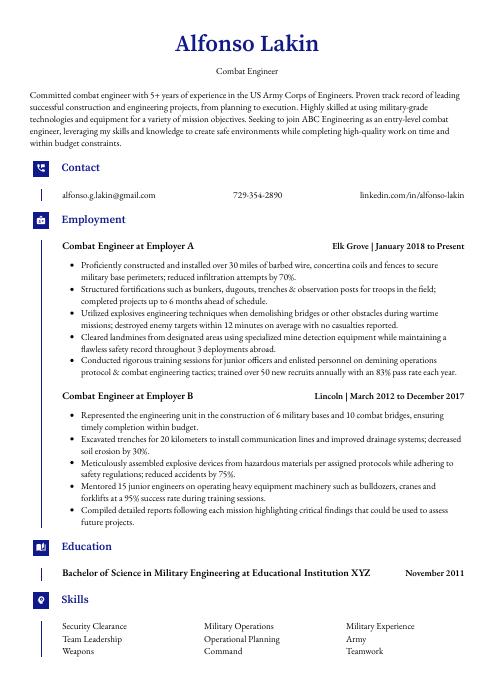
Gharial
Use this template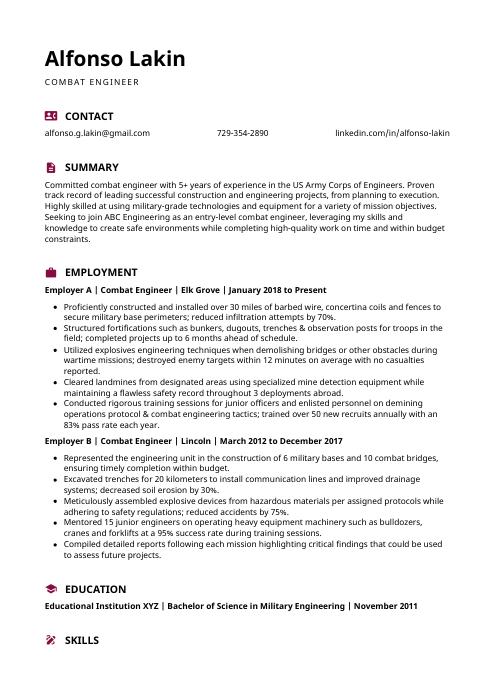
Hoopoe
Use this template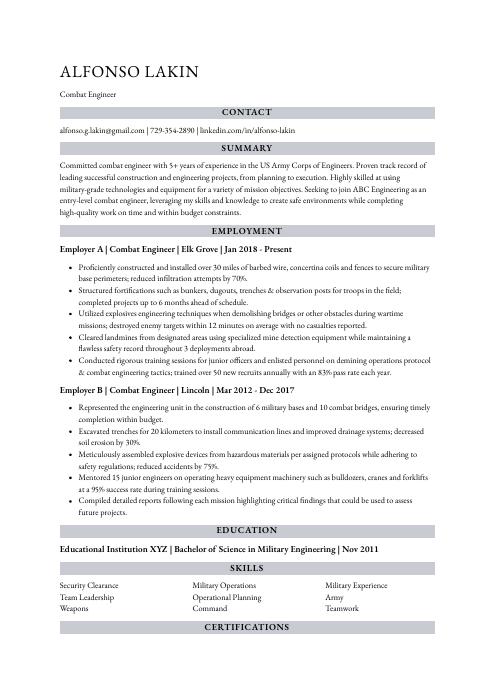
Numbat
Use this template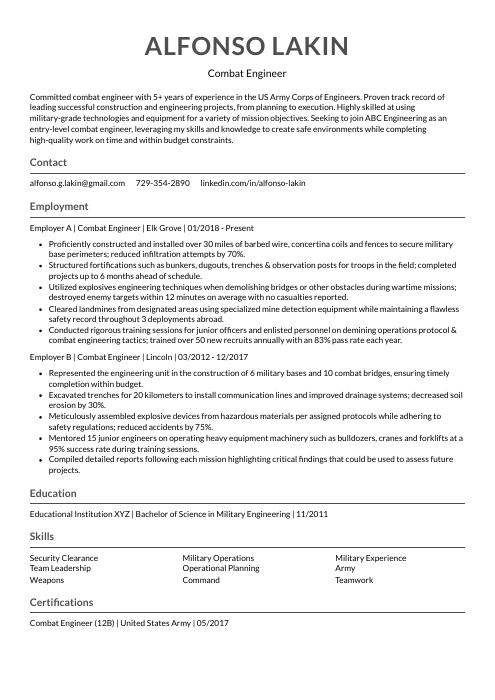
Indri
Use this template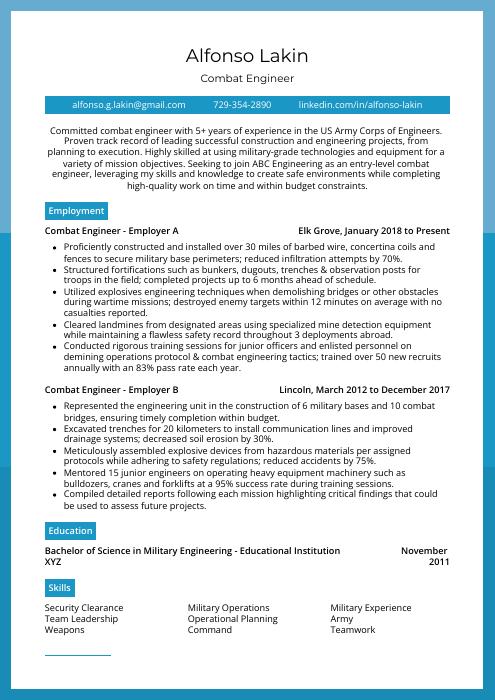
Rhea
Use this template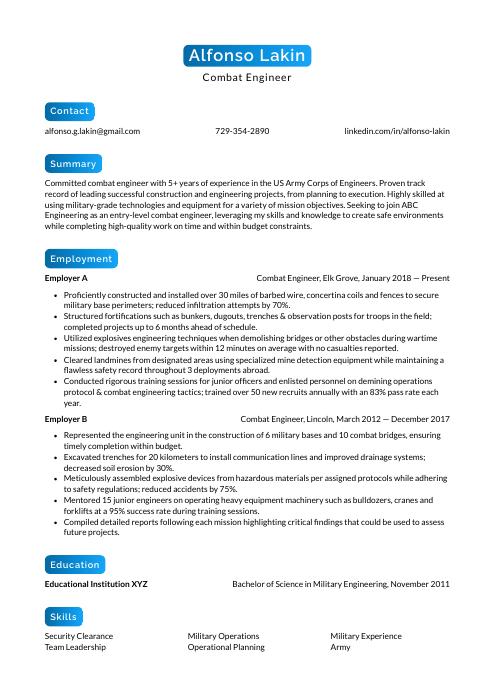
Kinkajou
Use this template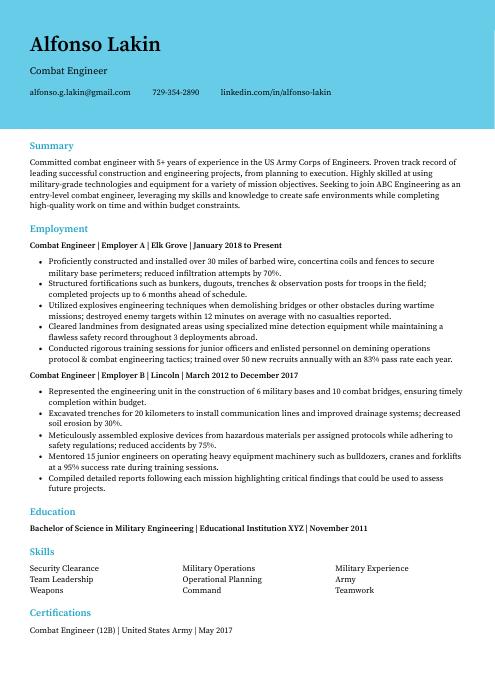
Dugong
Use this template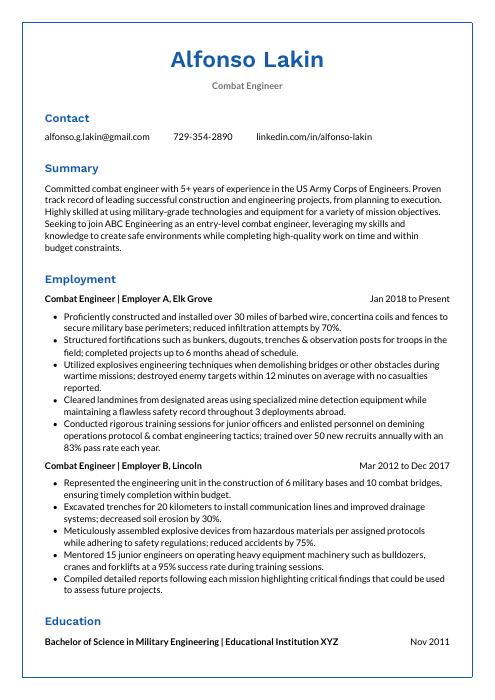
Markhor
Use this template
AI-Powered Resume Builder